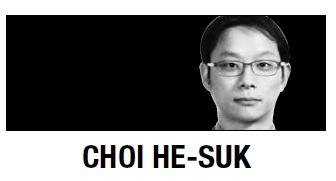
There is apparently this mysterious line that one is simply not meant to cross.
Anyone who crosses this line is simply wrong — or so say those enforcing this line.
For publications that want to be considered respectable, crossing this line means dabbling in yellow journalism. But this line is being crossed willingly and frequently by local media.
Everyday big and small media outlets churn out articles with catchy headlines that are sometimes accompanied by photographs that are only fit to be posted online after some editing.
A few months ago a small-time celebrity was killed in a car accident. Most news outlets carried this story, with one or two even going so far as to use photos of the late actress in a revealing outfit.
This shocking display of disrespect for the dead was carried out in the pursuit of Web traffic. The move appeared to have worked, as the actress became one of the hottest keywords on the Web portal Naver at the time.
It is an extreme example but everyone is doing it.
Even this column is nothing more than the ramble of a frustrated online editor whose main job is to maintain Web traffic.
Those who cross the line are usually fully aware of their actions. They are also probably aware that doing so is neither ethical nor anything remotely resembling what they signed up for in journalism.
So, why do it?
For Web traffic, of course. In an age when increasing newspaper circulation is next to impossible, online traffic is king. This phenomenon is nothing new, it is not even old news anymore. It has become so prevalent and natural — almost like breathing. People seldom give breathing a second thought — they just carry out the act. In the same way, media outlets cross the line and give in to yellow journalism.
In Korea, this unholy mess is made unholier by another problem.
The media’s reliance on several portal sites has grown, and in turn, the control these portals have on the media has also spread.
Portals have always monitored news stories being uploaded, but recently some of them have begun to take things one step further in what can only be described as controlling the media.
If a story or accompanying photo is deemed unsuitable for children or unnecessarily shocking, a monitor group operated by the portal promptly points this out.
What is deemed “unsuitable for children” ranges broadly, including the recent celebrity prostitution scandal, a nature video of an anaconda eating another massive snake, and of course the more understandable close-ups of cleavage.
The publication responsible for such content will be advised to make changes or take it down.
This might sound reasonable from one perspective, but it is unclear at what point the news had to be child-friendly.
Following recent changes a publication that racks up too many points on a portal’s scoring system will be removed from the portal’s news service, and for one year, it will not be allowed to reapply to be on the service again.
Under the scoring system, stories and images deemed inappropriate and keyword abuses, such as in the case of the death of the small-time celebrity, can incur points.
For a publication, a year removed from Korea’s biggest portal could lead to the near absolute decimation of its Web traffic. So, the dilemma local media outlets face is a stark one.
There is a clear need to raise Web traffic, but this is a tall order without the use of sensational headlines and shocking visuals.
While walking a thin line, news outlets also have to ensure that they remain in the portals’ good books.
It is possible that portal operators have no choice but to intervene before articles and pictures go overboard.
One Naver user even compared a portal’s news section to an “adult entertainment bulletin.” The user was referring to the increasingly shocking clickbait that had turned the portal’s news section into a collection of stories that included adult-oriented content such as gruesome murders, scantily clad women and sex-related issues.
While this might be the case, questions still remain. Who died and made Web portals the kings of journalism? Why have the media become so dependent on portals? And should portals be allowed to assess media outlets?
Choi He-suk is the digital contents desk editor of The Korea Herald. He can be reached at cheesuk@heraldcorp.com. — Ed.

